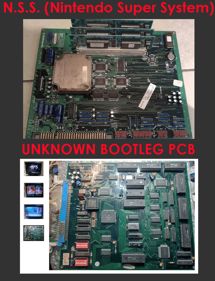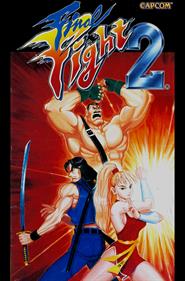Overview
Hardware:
The Final Fight 2 bootleg arcade machine was derived from the Nintendo Super System (NSS) arcade machine. This hardware features the Ricoh 5A22 (custom 65C816) CPU running at 3.58 MHz, an S-DSP sound processor running at 3.072 MHz***, an SPC700 sound coprocessor running at 1.024 MHz, and two picture processing units. This is essentially a Super Famicom or Super Nintendo converted into a Jamma compatible arcade PCB.****
Very few NSS hardware boards (bootleg or otherwise) exist in the present day due to CPU, PPU, and power supply failures.
Origin:
The Nintendo Super System (NSS) was an arcade machine developed by Nintendo that could play one or more custom Super Nintendo games, similar to its predecessor, the PlayChoice-10. There were over 1000 units known to have been sold to vendors, with 12 custom cartridges based on early Super Nintendo games. ActRaiser, Adams Family, Contra 3, F-Zero, Lethal Weapon, Robocop 3, Super Mario World, and a number of sports titles were the only titles released. It was discontinued in 1992.
From 1996 to 1998 an unknown bootlegger converted several later Super Nintendo games to run on an arcade PCB that was similar, identical, or repurposed NSS hardware. Those titles were: Final Fight 2, Ghost Chaser Densei, Gundam Wing, Iron Commando, Killer Instinct, Legend, Rushing Beat, Sonic Blast Man 2, Teenage Mutant Ninja Turtles Tournament Fighters, Venom & Spider-Man, Wild Guns, with the last release being Final Fight 3. These bootleg games were later dumped for use with the MAME project.
Release Information:
Final Fight Two was not officially released as an arcade game by Capcom. However, bootleggers reprogrammed it to be used on hardware similar to the
Nintendo Super System so that it could be used as a conventional arcade game (and generate revenue for clubs, restaurants, etc).
One of the PCBs shown here is actually of a Capcom CPS motherboard and not Final Fight Two. Additionally, there is a modern PCB being sold on Chinese websites with the same Final Fight Two bootleg program and that has yet another PCB.
Story:
It's been several years since peace settled in Metro City. With Cody and Jessica on vacation and Guy resuming his training out of town, everything seems to be in order. But recently, Haggar is feeling uneasy after learning that Mad Gear was not completely destroyed.
Once again the Mad Gear Gang has emerged and this time they want revenge. They'll stop at nothing to bring Haggar and the entire world down to its knees. This time they've kidnapped Guy's master, Genryusai and his daughter, Rena.
Now Haggar must travel the four corners of the globe to search for Genryusai and Rena. With the help of Maki and Carlos, the reign of the Mad Gear Gang will hopefully be destroyed.
***Note: Sources on the internet (including the MAME database) constantly confuse the speed of the 21.48 MHz timing oscillator with the actual speed of the Super Nintendo CPU, which was variable between 1.79, 2.68, and 3.58 MHz. While the 16-bit 65C816 was theoretically capable of doing more work per clock cycle than more conventional 16-bit CPUs at the time, there was never a 65C816 that ran faster than 14 Mhz.
****There is a newer Jamma compatible arcade PCB that runs similar programs, but it has completely different hardware than the bootleg Final Fight 2 PCB or official NSS. In fact, one board found online had a 32-bit Motorola CPU on it.
Sources:
MAME Machines Online Database
Museum of the Game & International Arcade Museum
DogP's Nintendo Super System Page
- Developers
- Capcom
- Publishers
- Capcom
- Platform
- Arcade
- Genre
- Beat 'em Up
- Alternate Names
- ファイナルファイト2Japan

- Wikipedia
- No information available

















